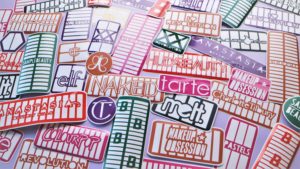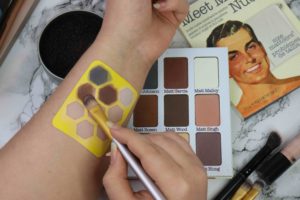At 24, I built a successful eCommerce business in my spare time – and you can too!
I’m Alli, the new Digital Marketing Executive here at JH, and for the last 3-and-a-bit years I’ve ran a successful product-based eCommerce business in my spare time.

For my very first post here on the JH blog, rather than rambling on about myself – telling you I love houseplants, Fleetwood Mac, and talking to my cat Oscar like he’s a small furry child – we thought it might be more interesting (and maybe even helpful) to share some of the stuff I’ve learned being a small eCommerce business owner. So… let’s get to it!
A little background
I started my business at 24 – at that time I was a year out of university, working as a Marketing Assistant, and I happened upon a product idea that didn’t exist yet.
Swatch Perfect is hard to explain if you’re not familiar with makeup, but to those not in the know I usually describe them as “body art stencils created for beauty bloggers, cosmetics brands and makeup enthusiasts”.
Over the last few years I’ve sold my products to everyone from nano influencers with 250 Instagram followers, to macro influencers launching their own brands; from online-only independent cosmetics manufacturers, to global brands you’d find stocked at your favourite beauty retailers. It’s pretty cool to look back on – and considering where I am now, pretty mind-boggling to think how I started it with £200 and a secondhand electronic cutting machine.

When I started, I didn’t have a mentor, I didn’t really even have any knowledge of running a business. I just had an idea… and I went for it. I designed a product, set up an online store, and set about trying to sell some products. With a little encouragement from my mum, of course. (Thanks mum!!)
It’s been over 3 years now, and here is my advice – both to you, but also to my past self. Because god knows she didn’t know what she was letting herself in for!
1. Get organised
Some of us are not gifted with the skills of organisation. We just aren’t. It might surprise you to know I was absolutely not the most organised person when I started my business.
There’s something about the pressure of being in charge of everything that forced me to pull my proverbial socks up. At work, if you forget something, more often than not, someone will remind you of it before it becomes a real catastrophe – when you’re self employed, that’s not always the case. You have to prioritise it.
Organisation isn’t an overnight thing, either. It has to be a habit. And it has to work for you! I’m old fashioned, and after trying a lot of different options, I discovered I best get on with a physical planner (and a nice pen). Even during 2020 I’ve been dedicated to my planner, stuffed with daily lists of tasks to complete – everything from developing seasonal campaigns and product launches to when my groceries are being delivered.

Whatever works best for you – a physical planner, digital calendar, or just lots of to-do lists – make the effort to stick to a system, and note down ideas, tasks and to-dos as you think of them. And if you’re really that terrible at it – maybe consider hiring a virtual assistant..!
2. Use the time you have
One of the most common complaints in our modern lives is that we ‘don’t have the time’. But trust me when I say this – you’d be surprised what you can fit into your schedule. Me, I’ve worked full time as a marketer almost the entire time my business has existed. I’ve used lunch breaks to design new products. Replied to customer queries when I wake up, instead of scrolling Twitter in bed. Written and scheduled social posts on public transport on the way to work. While I don’t recommend it to everyone, I’ve worked during public holidays, and even sometimes whilst actually on holiday abroad. Remember when we got to go abroad? Good times.
Like with anything you love, you find the time – it might be when your kids have gone to bed, whilst you’re watching TV, or maybe you prefer waking up at 5am to get in that extra work. Not for me, that one, but power to you if it is!
3. It won’t be easy
It can be a hard slog sometimes. I’ve spent entire weekends working on launches, regularly worked until 10pm, and once stayed up ‘till 2am making a huge last-minute custom order for a client.

You will fail, and it will feel impossible to go on. You’ll get angry customers, even when you’ve done everything right. You’ll start to wonder what it’s like to have time off.
But it will be worth it. If you truly love your product, your idea, your brand – your customers will, too. You’ll bring joy to people’s lives, and you’ll learn so, so much. You’ll develop in ways you never could have imagined, and you’ll improve skills faster than anyone could teach you them.
4. Be realistic
Look, maybe you aren’t Gymshark. That’s okay. We don’t all need to be multi-million pound businesses. I made £10k in my first year, which some people would turn their nose up, but for me at 25? That was awesome. 18 months prior I had £250 in my bank account. A year after starting my business, I owned an actual house. Not outright, but there’s a deed with my name on it somewhere. What a glow up.
You don’t need to have set numbered goals in your first year – I had no idea if I’d even sell one product, to be quite honest – but knowing what you’d like to achieve will help you set out steps to get there. If you still need to work a day job, don’t punish yourself for not growing as fast as others do. Even if you only have a handful of hours a week to work on your business, you can still build and grow a brand into something amazing.
So before you start – be honest with yourself about how much you can commit, and don’t set your sights too high. It’s fine to be ambitious, but if you’re knocked back easily, you might be putting yourself through more struggles than you need to. This process is meant to be fun – at least sometimes!
5. Don’t be afraid to ask for help
There was a time I nearly lost it in the early days. Back then I was doing everything – designing products, working on the website, running social media, making the content, answering queries, making and managing stock, packing and shipping orders – and I was working full time, too. One day I broke down. I nearly packed it in. Why was I putting myself through this?
Luckily, my partner came to the rescue. He recognised I was doing too much for one person to cope with, and he – very selflessly – stepped in to help. Nowadays he runs the stock management – making all the products, ensuring everything has reasonable stock levels – and for a long time he also mailed all the packages. He also makes many cups of tea, which is almost as important.

That made me step back and realise that just because it was my business, I didn’t have to do everything. I needed stationery designing – I reached out to my graphic designer friend. I needed ideas for new designs – I asked my colleagues at work for their thoughts. I needed new products demonstrating – I worked with influencers who created much better content than I could have. I’m lucky enough to also have had the support and understanding of the companies and managers who have employed me during this time, too – they’ve all recognised how valuable and useful this experience is in both my ability and well-being as an employee.
You might be surprised by the reaction from others – but I promise, people around you do want you to succeed. And in my experience, the best ones go out of their way to help you, just to see you thrive, and know they’ve been a part of that. All you have to do is ask.
6. Know your why
Your why is one of the most important aspects of your business, because it’s what will keep you going in your darkest moments. Why are you embarking on this terrifying, ridiculous, rollercoaster of starting your own business?
Your why can be personal, it can be financial, or it can be something else – everyone’s will be unique. My brother, for example (who is 5 years my junior but owns his own business and is a director in another) – his why is to make money. He’s able to see financial opportunity everywhere, and has the drive and dedication to go for it. He’s also a big risk taker – much braver in business than I am!
My original why was actually very personal. I’d wanted to start a business for the longest time, because I wanted to have something to support me and my family when I decided the time was right to have children. Having to choose between a career and a family – or worse, plopping my eventual kids in childcare and missing out on them growing up – terrifies me, and back then seeing colleagues around me at work going through that every day was gut-wrenching. Maybe this is an odd thing to think about when you’re 23, but it was weighing heavy on my mind, even with no plans to have children any time soon. I’m 28 now and I only just got a cat, so clearly that hasn’t changed.
Your why can change over time – mine certainly has. Instead of being a far-off future goal I’m working towards, my why has become much more aligned with the present day. It’s still supporting my family, but now the profits are helping to pay down our mortgage instead; having a second income also gave me the freedom to go part time for a while, and even the option to leave a day job when I needed to, free of too many financial worries.
7. Define (and refine) your unique angle
What can you bring to the table that no-one else in the world can? You don’t have to have a unique product. You just need to find your angle – something you can do, that no-one else can. For me, I knew my audience inside out, because at the time, I was one of them. I knew the landscape of the beauty blogging community – I knew how my products would be used, and what new makeup releases would be popular. And I knew their language. At the start – that was what I had, so I worked with it.

Over time, I learnt more. I launched products that succeeded – I launched products that flopped. I learnt styles and concepts that sold well, and discontinued those that didn’t. I studied social media analytics and discovered the kind of content that performed the best, and developed relationships with the influencers who could create that better than I could. I reviewed, developed and personalised my PR offering to make the gifting process a genuinely exciting experience, making a spot on my PR list a covetable position. All that stuff worked – customers kept finding me through Google searches and Instagram. Big brands discovered and bought from my website. Brand owners got in touch looking for custom products they could sell on their own site. I didn’t have the money to invest in ads – and at the start, I didn’t know what I was doing anyway – but the business grew organically despite this, and at a speed I could cope with.
So don’t worry too much about USPs – but definitely understand your angle. Is it your audience knowledge, technical expertise, or simply a unique personality your customers will identify with?
8. Invest in the resources you need
During the last 3 years, I’ve invested in a huge variety of things for my business. From a decent shredder to an iPad Pro – the similar thread running through all of them is that I wish I’d taken the jump sooner. What can I say? I’m a bit of a Scrooge…
There were a lot of things I didn’t even realise I’d need when I was starting out. Here’s some of them for you to think about:
Business insurance
I didn’t think I needed this for the longest time – but you do! You can’t put a price on peace of mind. Well – you can – mine is £15 a month.
Social media scheduling software
The time this saves me is more than worth the monthly price. I’ve tried a bunch, but for my business, Later works the best – easily being able to import user generated content, directly from Instagram, to my library, saves me several hours every month.
A virtual office/delivery address
You need a return address on packages, email footers, your Google business profile, and your website. I didn’t want to use my home address – so I pay just £4 a month to a local company for a registered address.
An accounting system that works for you
I started with a spreadsheet, but that didn’t work for me – I hate filling in spreadsheets! I now use QuickBooks, which automatically imports all my bank transactions, just leaving me to categorise them.
A dedicated business bank account
Separating the business’ finances from your own is worth doing, trust me. It took me a while to take the plunge – but the degree of separation between my own money and the business’ money has been really helpful. It’s also pretty awesome having a debit card with your business name on it..!

Your investments might look quite different to mine, but I’m sure you know what at least some of them are, however early on you are in your business. Whether it’s equipment, training, software or resources, don’t dither – if you really need it, get it. You’ll thank yourself in the long run!
Where next?
If there’s one thing I want you to take away from this – it’s that we all start somewhere. If I hadn’t taken the plunge when I did, not only would I not have my business, but I doubt I’d have developed the skills and experience to now be working at JH!
Here at JH we build amazing eCommerce sites for well-established and ambitious brands that are looking to take their business to the next level and grow – but most well-established brands start small. They start with an idea. They start with hard work, and dedication, and a sprinkling of passion.
The next big brand? Well, that could be yours.
Alli Metcalf is the Digital Marketing Executive here at JH. For more content like this, connect with Alli on LinkedIn, follow the JH LinkedIn Page, or subscribe to our mailing list for emails worth reading, direct to your inbox every week.